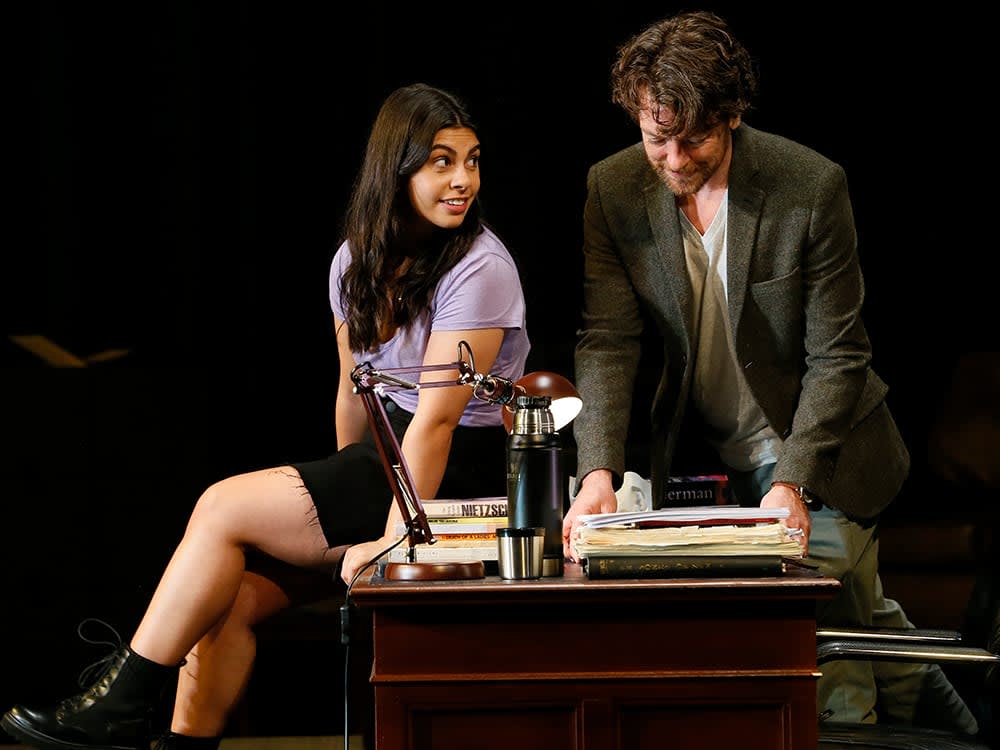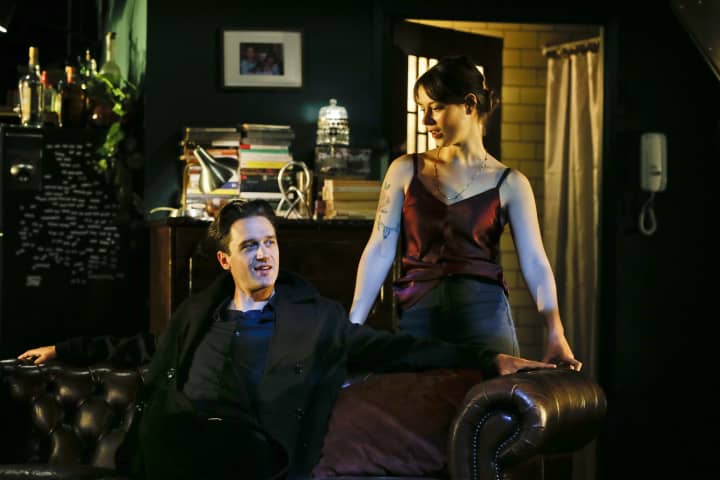‘I just think it follows on really naturally from last year,’ says MTC Associate Director Petra Kalive, who directed Sexual Misconduct of the Middle Classes, the first of the Company’s shows to be filmed. ‘But this is also something that has been part of the Company discussion for a long time, and it feels like COVID and the pandemic just kind of squeezed everything so that this had to happen.’
‘This’ specifically refers to MTC Digital Theatre. Beginning in 2021, the Company will professionally film in-theatre performances to be made available for an on-demand digital season, streamable anywhere in Australia. These performances are being captured with the help of MTC’s long-time collaborators Arts Centre Melbourne, whose Broadcast & Digital team are bringing their state-of-the-art equipment and experience to the project.
As Kalive notes, the events of 2020 proved pivotal in fast-tracking solutions to the technical, legal, financial and practical hurdles that had to be navigated in order to bring this long-held dream to fruition. Now that it’s finally here, she couldn’t be more thrilled. ‘It’s actually felt really seamless, and really quite easy,’ she says, ‘and that’s partly because of all the hard work behind the scenes, but also because we’re all so digitally literate now. So this is just another option for getting our live theatre. It’s a really exciting development!’
The live elephant in the digital room
Of course, she acknowledges the live elephant in the digital room. Part of the appeal of theatre is its ephemeral nature; filming it creates something else entirely. But Kalive suggests that it’s almost a new form of entertainment: the live filmed. ‘It requires incredible skill in the people cutting it together,’ she acknowledges, ‘because it’s so static compared to how they would normally film something on location. But at the same time, because it’s in front of a live audience, you’ve got that sense of being part of the conversation in a way that you don’t when you’re watching film and TV. And it’s a really interesting conversation that these two forms can have with each other, and that they can have with the audience. It’s almost like they sit hand in hand.’
The director suggests that Sexual Misconduct of the Middle Classes is the perfect play for the Company to take its first steps into these new waters, ‘as a complex work, where there’s so much to mull over, as a two-hander – which makes filming possibly easier – and as a really current work,’ she explains. ‘Because the work is directly addressed to the audience there’s something in the tone of it that translates quite well to being filmed.’

Dan Spielman addresses the audience in Sexual Misconduct of the Middle Classes. Photo: Jeff Busby
Among the many benefits MTC Digital Theatre will offer audiences, Kalive believes accessibility is number one: audiences who may have previously had physical, geographical, financial or other impediments to accessing our shows will no longer face such barriers. From this point of view, she says, ‘it’s extraordinary! I’m just really excited about what the form offers us.’
It helps that the video and audio captured by Arts Centre Melbourne’s Broadcast & Digital team is of such a high quality. Kalive admits that she initially thought the result might be something similar to an archival recording, which is typically shot from a static or handheld camera – ‘and seeing theatre on film like that just doesn’t translate; it’s awful!’ But having now been through the professional recording process, she’s a convert. ‘With the advances that have been made, with all these cameras, with the live editing, with the expertise. And seeing the live feed as it was being cut together in front of me on a screen was pretty extraordinary,’ she adds. ‘That felt really cool!’
The digital director
In charge of that live editing is Lillian Yau of Arts Centre Melbourne’s Broadcast & Digital team. Her expertise in live production is second-to-none: she has worked around Australia directing for Foxtel Arts’ Maestro Series. She has also multi-camera directed for the stadium screens at the MCG and other sporting venues. ‘I’ve been doing NBL of late, but my first love will always be directing cameras for music, theatre and all things arts!’
It’s invaluable experience however, especially for someone who thrives on the adrenaline of the live experience. And it helps her keep her instincts sharp, to trust the intuition she’s developed over years of filming live events: the intuition that allows her to follow the action, to sense when someone’s about to move – perhaps based on the way their feet are angled, or on how their body is positioned – and to make sure she has a camera ready to go with them.
‘I was just kind of blown away, that this was happening live in front of me, and they were editing it like they would live television, just in the moment.’ – Petra Kalive
But filming live events is as much about preparation as it is about intuition. For Sexual Misconduct of the Middle Classes, Yau and her team – a director assistant, and at least three camera operators plus a producer, technical director, audio engineer and editor – this meant reading the script, attending rehearsals, ‘furiously making notes’ as they watched the early previews, and then working with Kalive and her team on a paper edit: a shot-by-shot breakdown of the play’s script.
For Yau specifically, as the director of the digital version, working closely with Kalive helped ensure the filmed production remains true to and honours the live version. ‘We collaborated with her from the very start to the end of the post-production process,’ she says. It was important for Kalive to understand how Yau planned to cut the show, and how even minor adjustments to the live action have implications for how and when she cuts. Likewise, it was important that Yau understand Kalive’s vision, for the show as a whole as well as for each action, each scene. By way of example, Yau notes that although the character of Jon has a lot of the dialogue, it was essential to the piece that the audience is aware of Annie’s presence and reactions.
The filming process
The digital production of Sexual Misconduct of the Middle Classes was captured with four broadcast cameras in front of a live audience. During filming, Yau is exceptionally busy. She is paying attention to what’s happening on stage; watching the camera inputs; directing the operators; listening to her director’s assistant, who is following the script line-by-line to inform when she should be cutting from camera A to camera B; and she’s listening to her own instincts to inform if and when she should abandon the pre-prepared edit because ‘there’s some magic happening’ between the actors. ‘There’s a lot to look out for, a lot of multitasking. I’m always exhausted at the end.’
For Kalive, watching her show being live cut together onscreen was an unforgettable moment. ‘I was just kind of blown away, that this was happening live in front of me, and they were editing it like they would live television, I guess, just in the moment. As I was sitting there watching it, I had to remind myself not to watch the action onstage. My desire, as a director of live theatre, is to want to see how it’s moving around the space, so I was consciously trying not to look at the action on the stage and to just concentrate on the screen.’

Izabella Yena and Dan Spielman on stage in Sexual Misconduct of the Middle Classes. Photo: Jeff Busby
For audiences in the theatre during the filming, the cameras are visible but unobtrusive, and Yau reminds the actors that ‘this is a theatre performance; you’re not performing for the screen’. Kalive concurs, saying ‘Dan [Spielman] said he couldn’t even see the cameras. Izabella [Yena] just had one question: do I ever look at the camera? To which I replied: just pretend it’s not there.’
Looking to the future
Both directors are optimistic about the how MTC Digital Theatre will complement the Company’s traditional live shows. ‘There’s always a concern that if you film live entertainment people won’t come to the actual performance, the bums on seats kind of thing. We have to acknowledge that but also understand that if we stay in the traditional mindset, there’s a lot of missed opportunities,’ Yau says, echoing Kalive on the accessibility benefits. ‘I think it’s also a great gateway to live theatre.’
Kalive agrees. ‘It gives you a taster, it gives you a sense of what the experience is going to be like. And we get to showcase our work around Australia now; we get to showcase to the country how amazing Melbourne actors and creative teams are. That’s really, really exciting!’
The MTC Digital Theatre season of Sexual Misconduct of the Middle Classes is streaming until 16 May 2021. Video passes are on sale now.
Published on 26 April 2021





